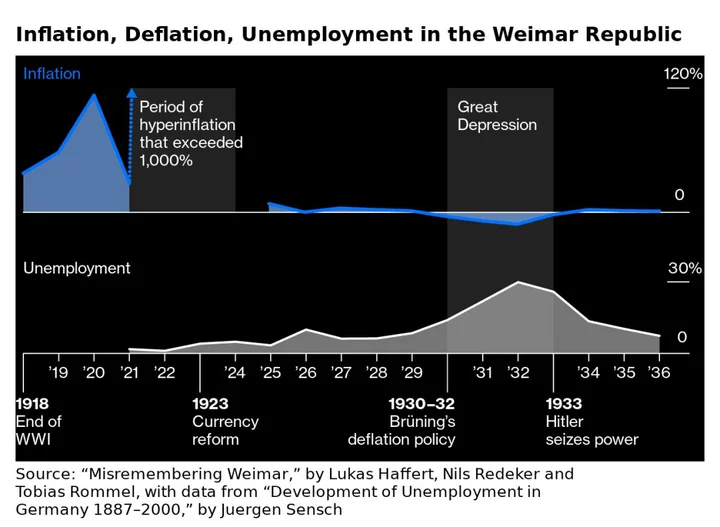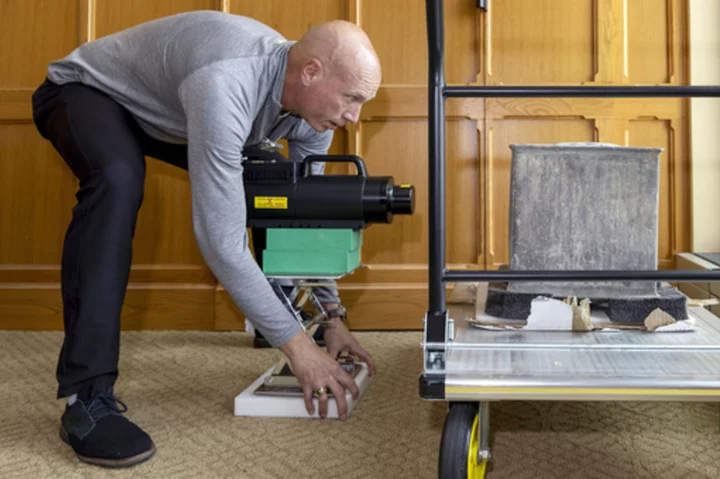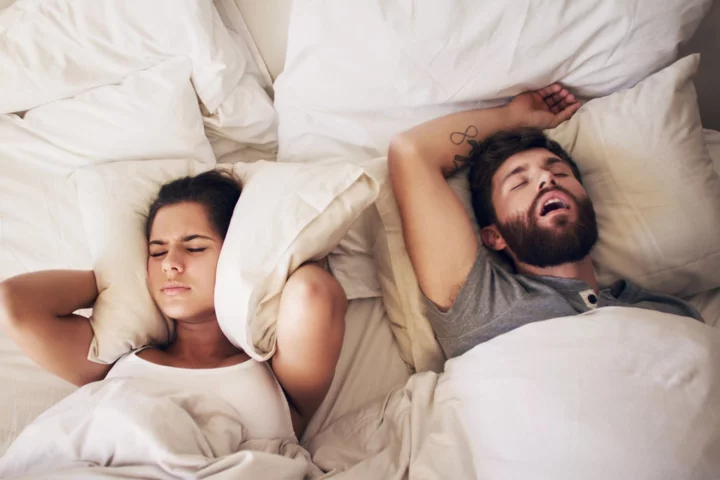
German Inflation Trauma of 1923 Strikes an Uneasy Chord Today
By late-1923, hyperinflation had rendered Germany’s currency so worthless that one woman used several billion marks of banknotes
2023-08-27 13:47

Ten-hut Time Machine? West Point to open time capsule possibly left by cadets in the 1820s
The contents of a long-forgotten time capsule recently discovered inside the base of a monument at West Point and believed to have been left by cadets in the late 1820s are set to be revealed
2023-08-27 12:49

China’s Travel Rebound Risks Super-Charging Jet Fuel Prices
After years of pent-up demand for leisure and business travel due to the ravages of Covid-19, millions of
2023-08-27 08:50

The 8 Best Books About Video Games Will Change the Way You Play
Video games are a wonderfully diverse art form. Some task you with visiting ring-shaped planets
2023-08-27 06:47

Google Wants to Let You Search for a Song by Humming It
Soon you might be able to hum a few lines from that song you can’t
2023-08-27 01:24

LEGO Launches a New Line of Braille Bricks
Just in time for Blind Awareness Month, LEGO is launching a new line of bricks
2023-08-27 00:20

This is why you should never order a cappuccino after lunch, according to Italians
Apparently most people are drinking their coffee completely wrong – and you’d better believe it, because it’s according to an Italian chef. Italian coffee lover Nadia, who has more than two million followers on her Instagram account The Pasta Queen, had a message for followers in her latest video. As an off-camera voice asked if she wants to have a cappuccino, she rolled her eyes and said: “No. It’s past 12.” Italians don’t drink cappuccinos after midday, she explained, adding: “It’s a breakfast drink.” “It's frothed milk! It’s good to awaken your senses before 10. If you really want to push it, 11. But not after 12.” She adds that when you’re eating a meal, “you’ve got enough going on” in your mouth and your stomach. “All you need is a quick espresso,” she said. “It’s like an American having a hot dog for breakfast.” However, some people seem not to appreciate being told when to drink their favourite coffee. Beneath the video some commenters were bewildered by the instruction. One person said: “I ordered a cappuccino in Italy, the waiter said no.” One viewer said: “I will continue to have my cappuccino morning, noon and night! I will especially continue to ask for a cappuccino after dinner when travelling in Italy just so I can p*** off the waiter.” Another said: “I am Italian and know of this ‘rule’ yet it did not phase me… I still ordered my cappuccinos in the afternoon and watched several natives enjoying one as well… It’s just steamed milk with espresso? Not sure what the big deal is? I say drink what you want, when you want. Respectfully.” However, others decided to trust the expert and sided with Nadia. A person commented: “You underestimate the power of Americans having just about ANYTHING for breakfast including last night’s leftovers.” It seems, as with most things food-related, the Italians know best. Sign up to our free Indy100 weekly newsletter Have your say in our news democracy. Click the upvote icon at the top of the page to help raise this article through the indy100 rankings.
2023-08-26 22:26

Century-Old Swiss Watch Dynasty Ends With Scion Selling to Rolex
Over more than a century, three generations of Bucherers built one of the most exclusive watch and jewelry
2023-08-26 19:23

Snoring before age 50 is a health ‘red flag’, experts suggest
Young adults who snore at night have a significantly higher risk of having a stroke and developing heart disease when they get older, a study has warned. Doctors have said that snoring should be treated as a “red flag” among adults below the age of 50. The study found that young adults who snore are 60 per cent more likely to develop a stroke when they reach middle age, and five times more likely to develop a heart rhythm disorder. The researchers presented their findings at the European Society of Cardiology Congress in Amsterdam. They examined data from 766,000 US adults aged 20 to 50. These included 7,500 adults with obstructive sleep apnoea, a condition that causes interruptions to normal breathing during sleep. This can lead to loud snoring and interrupted sleep as sufferers wake up while struggling to breathe. The study found that, over the 10-year follow-up period, patients with sleep apnoea were 60 per cent more likely to suffer a stroke compared to those who did not snore as frequently. They were also five times more likely to develop atrial fibrillation, a heart condition that causes irregular and often abnormally fast heart rate. Symptoms of atrial fibrillation include heart palpitations, dizziness and shortness of breath. Lead author Professor Sanjiv Narayan, of Stanford University, said: “Sleep apnoea is really common but we sort of ignore it because we think it’s trivial or just a little bit of a nuisance. “Until now no one’s really shown the magnitude of the size of the risk for heart diseases. That’s what really surprised us.” He added that the study looked at “relatively young people” who may not know they are at risk. “If they had a stroke, it would devastate young families. It could take them away from their workplace. It would destroy their lives for the next 40 years.” The researchers suggest that GPs should ask patients regularly if they snore and highlight if as a heart health “red flag” that could show they need more tests or medication. Obstructive sleep apnoea is fairly common and is estimated to affect 1.5m adults in the UK. However, according to the British Lung Foundation, up to 85 per cent of sufferers are undiagnosed and go untreated. Men who are elderly and overweight are particularly prone to sleep apnoea. Interruptions to normal breathing can cause a dip in blood oxygen and cause the heart and blood vessels to strain. Prof Narayan explained: “When you are unable to breathe it raises the pressure in the lungs until you ultimately wake up gasping for breath. That puts a pressure load on the heart, which causes stretch in the heart chambers, and that could cause the atrial fibrillation. “Another theory could be that the oxygen levels in the blood fall for tens of seconds and that could put stress on the heart.” Sleep apnoea can be treated using a CPAP machine, a device that pumps air into a mask that the patient wears over their mouth or nose while they sleep. The NHS also recommends making lifestyle changes such as losing weight if the patient is overweight and exercising regularly, which can improve symptoms. Sleeping on your side may also help relieve sleep apnoea. Read More I feel it in my fingers: Why more of us should start eating with our hands Sean O’Malley sparks outrage after claiming it’s OK if he cheats on his wife Woman praised for refusing to switch seats with child during eight hour flight Liam Payne reveals he was hospitalised due to a ‘serious kidney infection’ ‘Boy moms’ receive backlash for teaching sons how to cook - but for the wrong reason This is how stress affects different parts of the body
2023-08-26 17:49

Climate Change Is Helping Pests and Diseases Destroy Our Food
Pests and diseases are exacerbating crop shortages that have sent prices for goods like cocoa, olive oil and
2023-08-26 16:52

Beloved pets in Canada rescued from wildfires by volunteers who stayed behind
Many people who have evacuated communities in Canada's Northwest Territories because of raging wildfires have had to leave their beloved pets behind
2023-08-26 14:55

India Tightens Rice Exports in Threat to Global Food Prices
India imposed more curbs on shipments of rice to ensure its food security, a move by the top
2023-08-26 14:18
